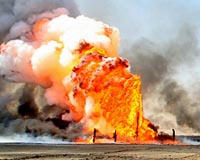 |
Abuja (AFP) June 30, 2009 The pollution caused by half a century of oil extraction in Nigeria is one of the world's most disturbing examples of the curse of natural resources, a global rights lobby group said Tuesday. Amnesty International said environmental pollution in Nigeria's southern oil region, the Niger Delta, had deprived tens of millions of people of their basic rights to safe food, clean water and good health. In a damning report released Tuesday, Amnesty described the situation in the Niger Delta, home to 31 million people, as a "human rights tragedy" which had fuelled anger and conflict. "People living in the Niger Delta have to drink, cook with, and wash in polluted water; they eat fish contaminated with oil and other toxins -- if they are lucky enough to still be able to find fish," said the report. Farmland in the region, one of the most important wetlands on earth, is being destroyed by oil spills. "After oil spills the air they breathe reeks of oil, gas and other pollutants; they complain of breathing problems... but their concerns are not taken seriously," the report added. Amnesty blames both the government and multi-national oil giants for the rights abuses in the south of Africa's most populous country. "Their poverty, and its contrast with the wealth generated by oil, has become one of the world's starkest and most disturbing examples of the resource curse," the report said. "The destruction of livelihoods, the lack of accountability of both the government and the oil companies, and the failure of the government to invest in development in the area, all feed the frustration which has increasingly found expression in conflict -- often violent conflict," Amnesty said. The most active of the militant groups has been the Movement for the Emancipation of the Niger Delta (MEND), responsible for many of the oil installation attacks over the past three years. The regional militants and bandit gangs that rove the creeks of the Niger Delta have brought current crude production down to 1.8 million barrels a day compared with 2.6 million at the start of 2006. Oil spills, waste dumping and gas flaring are endemic in the region, where at least 60 percent of the population relies on the natural environment for their livelihood. "The Nigerian government is failing in its obligation to respect and protect the rights of people in the Niger Delta," said Amnesty's head of business and human rights, Audrey Gaughran. "Some oil companies... have taken advantage of this government failure, and have shown a shocking disregard for the human impact of their activities," she added. Royal-Dutch giant Shell, the largest operator in Nigeria, blamed much of the oil spillage on sabotage, dismissing Amnesty's report for not constructively helping to improve the situation. Amnesty "forget(s) that about 85 percent of the pollution from our operations comes from attacks and sabotage", said Shell spokesman Olav Ljosne adding that 133 Shell workers had been kidnapped in the delta since 2006. He added the report "does not address the fundamental issues -- poverty, crime, corruption and militancy." Amnesty, however, said a recently set-up national oil spill detection and response agency (NOSDRA) "appears to have a more robust approach" to the problem. Gaughran said the Nigerian crisis is an example "of the lack of accountability of a government to its people, and of multinational companies' almost total lack of accountability when it comes to the impact of their operations on human rights". Nigeria, the world's eight largest exporter of crude, relies on oil for more than 90 percent of its export revenue. In a bid to end the delta conflict, President Umaru Yar'Adua last week offered unconditional amnesty to the militants. But Gaughran slammed the amnesty offer saying it was treating symptoms and not the root causes. "I don't think the amnesty will work and our concern is that it legitimises or allows impunity for the human rights violations that have been committed," she told reporters in Abuja. Protests -- armed and peaceful-- "are frequently met with excessive use of force ...including extrajudicial executions", said Amnesty. Share This Article With Planet Earth
Related Links Powering The World in the 21st Century at Energy-Daily.com
 Britain's BP, Chinese oil firm win Iraq deals
Britain's BP, Chinese oil firm win Iraq dealsBaghdad (AFP) June 30, 2009 British energy giant BP and China's CNPC International Ltd were unveiled Tuesday as the first foreign firms in decades to win contracts to invest and develop in Iraq's war-battered energy sector. The companies succeeded in their bid for the giant Rumaila oil field in southern Iraq, which has known reserves of 17.7 billion barrels, the oil ministry announced. The contract was the first to ... read more |
|
| The content herein, unless otherwise known to be public domain, are Copyright 1995-2009 - SpaceDaily. AFP and UPI Wire Stories are copyright Agence France-Presse and United Press International. ESA Portal Reports are copyright European Space Agency. All NASA sourced material is public domain. Additional copyrights may apply in whole or part to other bona fide parties. Advertising does not imply endorsement,agreement or approval of any opinions, statements or information provided by SpaceDaily on any Web page published or hosted by SpaceDaily. Privacy Statement |